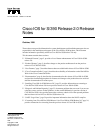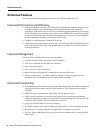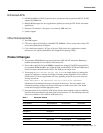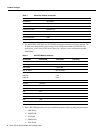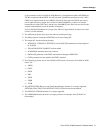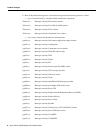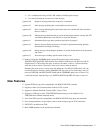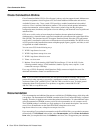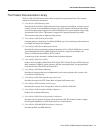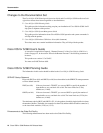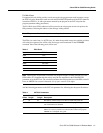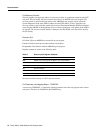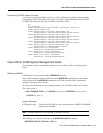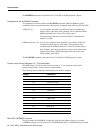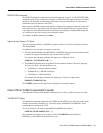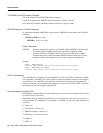
Cisco IOS for S/390 Release 2.0 Release Notes 3
Enhanced APIs
Enhanced APIs
• OS/390 OpenEdition (UNIX System Services) asynchronous I/O (required for DB2 V5 TCP/IP
support) and SRB mode.
• Multiple BIND support for server applications (parallel processing for FTP, Telnet, and vendor
applications).
• Enhanced TLI interface—data spaces, cross memory, SRB mode, etc.
• SAS 6.0 support.
Other Enhancements
• Year 2000 support.
• FTP server support for IP address as RACROUTE TERMID—allows security rules to deny FTP
access unless permitted by IP address.
• Cisco router-based queuing—IP Type of Service (TOS) can be set for applications to better
interface to Cisco queuing mechanisms like Weighted Fair Queuing (WFQ).
Product Changes
• The parameter WRELIM has been removed from the UDP and TCP statements. Buffering is
handled automatically in Cisco IOS for S/390 release 2.0.
• Some of the control blocks for the POOL command have changed. The EPCB control block is
now called the SEPM, the SRE is now called the SAW, and the ARCB, TUCB, and TSQB control
blocks have been combined into the ATCB. The 256B pool no longer exists.
• The message ACC210I Internet Protocol Task Started no longer displays to indicate that
startup has completed. A message will display indicating startup completion in Cisco IOS for
S/390 release 2.0. The message number will vary, depending on the device you are using; the
message text will be
Media media_name is now operational with one or more active interfaces.
Initialization and termination messages now appear in mixed case. This may impact some
automated operations packages that search for messages to invoke some action. You should
review these messages and take appropriate action.
• Some parameters for Cisco IOS for S/390 release 2.0 have been renamed to improve readability,
but aliases have been added for the names used in Version release 1.0. The following names and
aliases are available for Cisco IOS for S/390 release 2.0:
Table 1 Parameter Aliases
Parameters Aliases
MAXSNDBUF MAXSENDBUF MAXLSEND MAXLSND
MAXRCVBUF MAXRECVBUF MAXLRECV MAXLRCV
DEFQSEND DEFQSND
DEFQRECV DEFQRCV
DEFSNDBUF DEFSENDBUF DEFLSEND DEFLSND
DEFRCVBUF DEFRECVBUF DEFLRECV DEFLRCV
MAXTSEND MAXTSND MAXLTSEND MAXLTSND
MAXTRECV MAXTRCV MAXLTRECV MAXLTRCV



